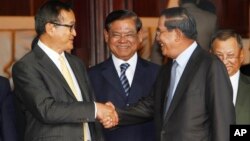Cambodia’s political deadlock has ended.
For nearly a year, the opposition Cambodia National Rescue Party has refused to join the government, calling for electoral reforms in a system it says was deeply flawed.
Following nearly five hours of meetings between top opposition officials and Prime Minister Hun Sen, that deadlock has ended.
The two sides finally reached agreement on a formula for selecting the National Election Committee, which the Rescue Party said was biased toward the ruling Cambodian People’s Party.
Hun Sen and Rescue Party President Sam Rainsy emerged from talks Tuesday smiling and shaking hands.
“Victory,” Hun Sen told reporters after the meeting. “You can all applaud.”
The two sides agreed on a formula for selecting the National Assembly: four members selected by the ruling party, four selected by the opposition, and one member agreed upon by both. Officials called the formula the 4-4-1.
Both sides also agreed to revamp voter registration lists, which have been criticized for leaving out many opposition supporters at the grassroots.
They also agreed that the CPP will chair the National Assembly, with a vice chairman seat to go to the Rescue Party.
Sam Rainsy told reporters Tuesday the compromise was the right way to end the impasse.
“We had only one proper choice, to end the political deadlock and end tension in the country,” he said.
Seven Rescue Party lawmakers and one assistant were released from jail and all charges dropped, as a part of the deal on Tuesday.
The lawmakers, including outspoken leader Mu Sochua, had been in jail for nearly one week, following violent clashes between supporters and city security personnel.
They are facing criminal charges of insurrection and incitement of violence that carry penalties of up to 30 years in prison.
Some 300 supporters waited to greet them, despite pouring rain Tuesday evening.
“I want to thank all nationalist citizens, that we have united our forces to push forward our nation for peace,” Mu Sochua said after her release. “I encourage all citizens to join us to build up democracy.”
Ny Chakrya, lead investigator for the rights group Adhoc, lamented the leveraging of prisoners in what he called a “political game.”
“It was part of a negotiation,” he said. “But I regret that they arrested people to make conditions for politics.”
Last week’s clashes were over a monthslong ban on public assembly and the closure of Freedom Park, a sanctioned gathering place for demonstrations, which remains closed.
Prum Sokha, a senior CPP lawmaker, said Freedom Park would be reopened after Rescue Party members swear in at the National Assembly—officially ending the deadlock.







